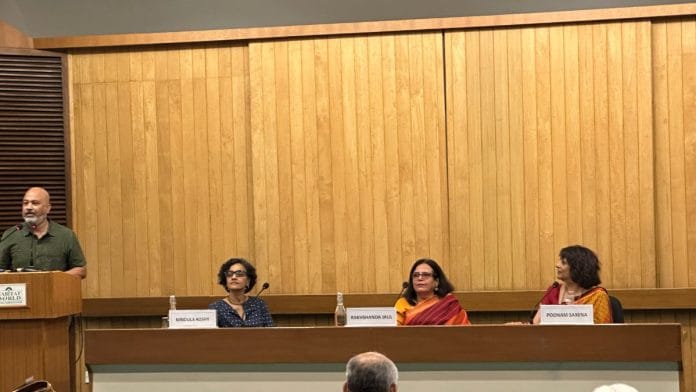New Delhi: On a balmy Sunday evening, the capital’s literary enthusiasts gathered at India Habitat Centre’s Gulmohar Hall for a conversation about the city itself. The launch of Basti & Durbar, Delhi-New Delhi: A City in Stories, edited by Rakhshanda Jalil, provided the perfect springboard.
Ravi Singh, co-founder of Speaking Tiger, the publisher of Basti & Durbar, opened the evening by responding to a wry remark about the absence of a Bengali translation. It will soon be remedied, he promised half in jest. It set the tone for the event: conscious of how Delhi’s stories move across tongues and times.
As Jalil read a passage from the anthology, she paused to muse on a surprisingly intimate editorial dilemma: whether to refer to Delhi as ‘she’ or ‘it.’ ‘It’ was ultimately chosen, a choice for neutrality, but not detachment.
The book paints a vivid portrait of Delhi’s literary imagination across English, Hindi, Urdu, and Punjabi, spanning the 19th to mid-20th centuries through stories by 32 writers. But not all its portrayals are tender.
“We are used to Khushwant Singh-type of stories…..I wanted to collect first-person accounts of those who lived their daily lives here,” she said, when panel moderator, the journalist and editor Poonam Saxena, asked her why the anthology leaned toward the sombre.
‘’This book isn’t a definitive claim to Delhi, it’s just a part of the city,’’ Jalil added.
‘My heart rests in Delhi’
The conversation moved seamlessly between the personal and the historical. Rakhshanda Jalil recalled her husband’s arrival in Delhi; he had just Rs 500 to his name, and hopes to secure a place at St Stephen’s College. It’s a narrative familiar to many who come to the city with little but end up tethered to it for life. For Jalil, these recollections weren’t merely anecdotal; they illustrated Delhi’s peculiar magnetism – a city that both demands and rewards allegiance. “My heart rests in Delhi, through the good, bad, ugly,” she said, smiling.
But why is it so difficult to hate Delhi, asked an attendee. Author and panellist Mridula Koshy answered this time, describing the city as having a “shimmery quality’’ that offers inhabitants endless possibilities. Koshy recalled her own return to Delhi after over two decades in Los Angeles. She was taken by the city’s “extraordinary scale”, and how living in the capital imparted a larger-than-life sense of duty and calling never quite found in the more horizontal, sedate rhythms of LA.
“Delhi insists on purpose,” she said. “You can’t coast here-you’re either fighting for something or building something.”
The title ‘Basti and Durbar’ embodies the duality of Delhi, she further said – a city where both grandeur and deprivation exist in relentless proximity.
It was during this intense discussion on Delhi’s emotional geography that Professor Simran Chadha of Delhi University offered a line that instantly captured the room: “New York is a city that never sleeps; Delhi is a city that never ends.’’
Also read: 24, Jor Bagh gets its last hurrah—the art space that became a metaphor for Delhi
Delhi recited and remembered
The discussion also touched upon the dilemmas of translation. Nirupama Dutt, who translated Kartar Singh Duggal’s contribution to the book, fondly remembered Punjabi writers such as Amrita Pritam and Krishna Sobti. Translating Duggal’s story, she said, reminded her of Pritam and Sobti’s fearless clarity and emotional depth: “Their language was full of love, rebellion, and ache, like Old Delhi itself.”
Dutt then recited Bashir Badr’s couplet—which always returns to her when she thinks of the city’s bruised but beating heart: “Dil ki basti purani Dilli hai, jo bhi guzra hai usne loota hai (The heart’s dwelling is Old Delhi, everyone who passed through plundered it).” The room fell into a reflective silence, gently broken by an appreciative round of applause.
Jalil lamented how many of Delhi’s historic monuments are neglected, referencing the unnamed mosques and crumbling baolis that have been absorbed into the anonymity of modern neighbourhoods. She attributed this partly to the migratory nature of Delhi’s population. “Those for whom the city was originally built have largely left,” she said.
The event closed with Koshy reading from her contribution to Basti & Durbar – an excerpt from her 2016 book Bicycle Dreaming, which revolves around the 13-year-old child of a kabadiwala (scrap dealer) in Delhi. Smiling, she recalled that she wrote the prologue of her own book after finishing the whole story – making it, in spirit, “an epilogue”.
As evening settled over Lodhi Road, it was hard not to reflect on what it truly means to call Delhi home, a city perpetually reshaped by time and change. Basti & Durbar offers no easy answers, but as the editor suggests, perhaps that very ambiguity is Delhi’s greatest, most exasperating, and most beautiful gift.
(Edited by Zoya Bhatti)






